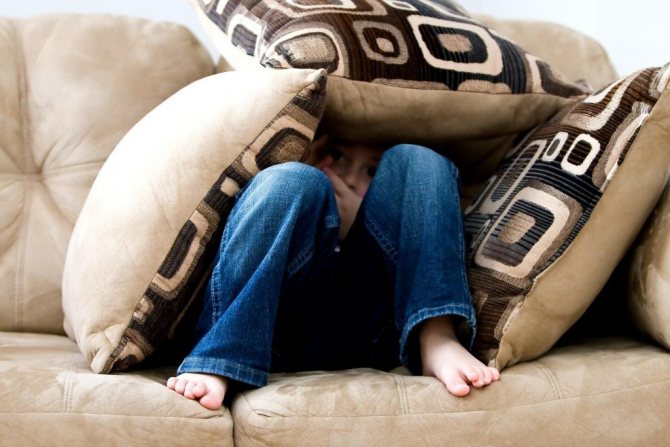Probably, many of us have made a vow to ourselves - never to yell at our child. But torn tights, paint spilled on the floor, homework not done on time made us so angry that we, forgetting about the promise we made to ourselves, raised our voices at the child, and some even started screaming. Afterwards, of course, we scolded ourselves and promised not to let this happen again, but... again, lessons are not learned, a crystal vase is accidentally broken, and again the child hears mom or dad yelling at him like a fire siren.
Are we doing the right thing? What to do if screaming has become a habit in the family? And how to cope with your own anger and irritation? You will find answers to questions in this article.
Why can't you yell at children?
Screaming at its core is a manifestation of aggression. When aggression comes from the dearest and closest people, the child experiences it very hard.
If a child grows up in an atmosphere of constant screaming, scandals and parental nervous breakdowns, he suffers from:
Personal development
The child gradually becomes withdrawn, anxious, unsure of himself, and often cries. Mental development is inhibited, it becomes difficult for him to perceive and remember new information. He is always in a shell, as it were, protecting him from the outside world. The child begins to be afraid of situations of failure (answers at the board, competitions, public speaking) and new acquaintances.
As adults, such people seek constant support and approval for their actions; it is difficult for them to change jobs or meet new people, because... they subconsciously expect failure and aggression from others.
Social development

The child does not develop basic trust in the world. If the closest and most beloved person, like mom or dad, offends, then anyone can offend. The child stops trusting others and has problems building friendships and love relationships.
A child whose parents constantly raised their voices will continue to behave in the same way in their family with their children.
Child-parent relationships
Trust and mutual understanding leave the relationship. The child stops sharing his problems for fear of causing a negative reaction from his parents. Thus, mom and dad turn from close people into strangers.
Causes of parental anger

Now let's talk about the reasons that make parents take it out on their children:
The desire to prove your authority, to dominate the child (“I’m older and smarter, which means I know better what you need”)
The parent is angry that the child does not obey him, the adult, so he tries to show his power over him by shouting. Screaming and raising your voice is the easiest way to get what you want from a child, to subjugate him to yourself.
Fatigue, stress, irritability, loss of control over your emotions
Many parents, after a hard day at work, come home and begin to find fault and yell at their child for any reason: he didn’t learn his homework, didn’t wash the dishes, tore his uniform, broke a toy. Most mothers, being on maternity leave and not receiving help from their husbands and loved ones, begin to take out their anger and irritation on the innocent baby.
Overprotection

Mom and dad, trying to protect the child from any dangers, use screaming as a means of reinforcing prohibitions and restrictions.
Such parents on the playground, in a store or on the street talk to their child only through commands: don’t climb the slide, don’t touch the dog, move away from this boy, watch your step, and the like.
Get rid of overprotection and start building a trusting relationship with your child. To remain calm about his safety without constant monitoring, download the “Where are My Children” application from the AppStore and GooglePlay stores.
Child's failure to meet parent's expectations
Almost all parents (and maybe absolutely everyone) want obedient, well-mannered children who know almost from birth that you can’t draw on wallpaper, porridge is the best food for breakfast, and you have to obey your mother day and night.
Even during pregnancy, the expectant mother paints in her imagination pictures of a happy future and an ideal child in her understanding. But a child is born the way nature created him. He has his own character, his own inclinations and preferences. And they do not always coincide with what parents expected from their son or daughter. Therefore, many begin to get angry with the child, taking out their frustration and irritation on him for not being what they would like him to be.
Model of behavior from childhood

A child who grew up in a family where mom and dad are used to talking in raised voices, where screaming and swearing have become normal companions of life, will do the same in his own family. Be rude to your husband/wife, yell at your child, and if in his childhood there were cases of physical aggression from his parents, then he too can allow this to happen.
Why is this happening? Initially, parents are the main people in a child’s life. And their relationship with each other is an example of what a family should be like, what mom and dad do in it, what their roles and functions are.
Many children, growing up, say to themselves: “I will never be like my father,” “I will never behave like my mother,” but the parental behavior model learned in childhood comes to light sooner or later. And now a calm and balanced woman shouts in anger at her son or daughter: “Stop being disgraceful! What kind of child? Why did I even give birth to you?” just like her mother once did.
Ignoring the age characteristics of children

A 4-year-old child cannot physically or mentally calmly stand still for half an hour while his mother talks with a friend, dress independently in five minutes and fall asleep as soon as the lights are turned off in the room. But many adults simply forget about this and demand from children those actions for which the child’s brain is not yet mature.
Fast pace of life
We are all in a hurry somewhere, in a hurry: work, kindergarten, school, shops, trips to relatives. It’s rare that a mother, picking up her child from kindergarten, allows him to slowly get dressed himself, slowly walk home, while looking at the trees, birds, houses and cars. But a small child lives in his own world, where it doesn’t matter that “we’re already late for the pool, but we still have to stop at the store on the way!” For him, much more interesting is this little bird with a red breast on a tree and this excavator with a big bucket. As a result, the child is in no hurry, the mother believes that he is doing this out of spite, lashes out at him and starts screaming.
Personal experience: I don't yell at kids anymore.
It is difficult to admit to yourself that you are not an ideal mother who will always find the right approach to her child. I have two of them, both are still small, but we have already experienced a lot together, learned a lot and continue to look for ways to interact.
Once again listening to screams from the neighboring apartment (and the walls in modern houses are thin), I sympathized with the mother and felt sorry for the growing daughter, who responded in the same tone. And she remembered how she herself yelled at her children in the same way. Yes, the word is ugly, and I still feel guilty for my behavior. But I don’t stand still, and every day I look for ways to become a better mother for my kids.
Before eliminating the investigation, it is worth understanding the reasons why we, mothers who sincerely love our children, yell at them? Certainly not because of bad behavior, because often, after a while, we analyze the situation and understand that the child did nothing special.
Why?
Fatigue and lack of sleep are probably the most common reasons. Motherhood is a 24/7 job, without days off or holidays. You spin around all day like a squirrel in a wheel, and in the evening you realize that life is passing you by, that you don’t have time to do anything, nothing makes you happy. And sooner or later you begin to lash out at your family, and the closest one is a defenseless child.
Dissatisfaction with yourself . Most often it covers if the body has not returned to shape after pregnancy. This black cloud haunts my mother, who, it seems, cannot find a moment for herself. Gradually, the woman succumbs to apathy, stops taking care of herself altogether, dresses inconspicuously, forgets about makeup, and braids an unsightly ponytail on her head. And he plunges even deeper into the abyss of discontent. Vicious circle.
Breast-feeding . Suddenly? I have experienced from my own experience that this is a very significant reason for nervous breakdowns: while I was feeding my youngest child, I was extremely unbalanced. The baby literally squeezes all the juices out of his mother. This does not mean at all that you urgently need to transfer him to mixtures. Simply understanding the cause reduces the problem by half.
Childhood experience. Some women yell at their children because they don't know any other way to interact with them: their mothers yelled at them, and their parents yelled at them, and so on. Psychoanalysis works with similar problems.

Pixabay.com
How to stop yelling at children?
- Get some sleep. A rule that works for me 90 times out of 100. How to do this if the child wakes up several times a night? Establish a routine in which children go to bed at 8, maximum, 9 pm, and go to bed with them. Yes, I want to be with my husband, or finally mind my own business. But if you feel tired, good sleep is essential. You can do this every other day: your husband will understand, but things can wait.
- Decide on household issues when the children are awake, and deal with personal issues during their naps. Does your child always ask you to play with him? Wonderful! Take it with you to the kitchen, let it help you cook borscht. Need to clean your apartment? Give him a broom or a small cloth. Yes, you will spend more time (you will have to wash up after the child), but you will free up a couple of hours for yourself.
- Spend the free time only on yourself : draw, read, play sports, embroider, in a word, do whatever you like. Then after two hours of baby sleep you will be as good as new. A rested mother will not yell at her children.
- Look for ways to be without children : give them to your grandmother, husband, sister, nanny and go for a walk. Go to the cinema, go shopping for clothes (a luxury for mom, right?), Meet with friends. Such reboots are needed at least once a week for an adequate mental state.
- Take care of yourself. It doesn't matter how many extra pounds you've gained. The main thing is that your husband and child love you for who you are. Now let's improve what they love: let their hair down, get a pedicure, wear a dress instead of jeans, line their eyes, and go for a walk! You will be the most beautiful mother on the playground. Well, of course, we’ll get rid of the kilograms, it’s just a longer path, the main thing is not to leave it.
- Find something useful and interesting to do. Many mothers suffer during maternity leave from their own unfulfillment, worthlessness and uselessness. I almost drove myself into depression with this state of mind. And, of course, the children, who were nearby all this time, could cause a storm of indignation with one awkward movement. When I finally found myself, everything changed. Now I relax, doing what I love.
- If you are breastfeeding, add vitamins to your diet. Personally, after pregnancy I forgot to drink them, and in vain. I recommend that mothers go to a health food store and pick up various healthy goodies - from dried fruits to cereal bars. Regularly consume cottage cheese, milk, and sour milk. Well, you can also add soothing teas. I prefer mint.
- Communicate with parents. There is a meditation that helps you understand and forgive your loved ones: sit facing the wall, calm your mind, watching your breathing and trying not to think about anything. Then imagine your mother or father in front of you and talk to them, express your pain and grievances. Be sincere, allow yourself emotions and tears, try to forgive. Sometimes this practice needs to be done several times, sometimes one is enough. It is not necessary to express your grievances to real parents, since this threatens conflicts and new disappointments.
And the last secret on how to stop yelling at your children: you are already halfway to conquering yourself if you are reading this article, if you are looking for ways to interact with your child and are ready to make efforts to change everything. I haven't stopped furrowing my brows or using a stern tone if the children deserve it, but I'm less and less likely to raise my voice to the point of shouting. This is my small victory.
If you want to receive our articles regularly, join the communities on social networks VKontakte and Facebook
Elena Lukashova
I am a journalist, translator, certified yoga instructor. But, perhaps, to a greater extent, she is the mother of two beloved children. The “Unideal Parents” project is my attempt to find answers to my maternal questions. Due to my profession, I have the opportunity to communicate with specialists, masters of their craft. The results of our cooperation are on the pages of this site. I hope we answer your questions too...
Share with friends:
How to stop taking it out on your child?

Managing our emotions
Long-term observations of psychologists show: if in a family parents set an example of calm and balance, then children grow up the same.
But how can you become calm and balanced in the modern world, you ask, if there is only stress around? The answer is simple: you need to learn to manage your emotions.
What does it mean to manage emotions? This means understanding their reason, feeling it, hearing what they want to tell you. Where does your anger come from? Why are you feeling frustrated now? What exactly upset you about this situation? Ask yourself these questions often and you will learn a lot about your inner world and the feelings you experience.
The psychology of emotions is such that events in our lives do not have any emotional connotation. We choose what color to paint them and how to react to them. For some, a broken plate is a reason to yell at a child, but for others it is a reason for happiness.
Remember: it is impossible to be happy and radiating optimism 24 hours a day. Therefore, accept your emotions - both positive and negative - and learn to live in harmony with them.
Relaxation techniques for a tired mom

Anger, anger, irritation accumulate in us, interfering with a full and harmonious existence. An angry and irritated mother cannot give her child love and support. What the vessel is filled with is what pours out of it.
That's why it's so important to get rid of negative emotions first. This process can be compared to the treatment of caries: first, all affected areas of the tooth are removed, and then the vacant space is filled with filling material.
What will help a tired mother relieve stress? Everyone chooses their own. It can be:
- Walks in the open air.
- Get more than 8 hours of adequate sleep.
- Communication (live and virtual).
With friends, relatives, in a chat where you can share your problems, get the advice you need, listen to different opinions.
- Physical activity.
A great way to relieve stress. This could be running, swimming, dancing, yoga, some people like strength training. Even 15 minutes of morning exercise can energize you for the whole day.
- Personal care.

Taking a bath, massage, manicure, pedicure - all these feminine joys improve your mood and allow a woman to feel like a Woman.
- Music.
Agree, even washing dishes and cleaning is more pleasant to the accompaniment of The Beatles or ABBA than in complete silence.
- Drawing.
There is such a direction as isotherapy - treatment with drawing. A person who draws expresses his disturbing feelings on paper, thus working through them and coping with them.
- And the most important advice - listen to yourself!
Listen to your feelings, emotions, inner state, often ask yourself the question “What do I want now? What do I need right now to feel good?”
Do what you like, spend time on what you want. At the same time, continue to be aware of where your child is, what he is doing and whether everything is okay with him! Install the “Where are My Children” application from the AppStore and GooglePlay services.
5 ways to control your anger

- Analyze in what situations your child’s behavior causes you to have outbursts of anger and whether something can be done to prevent these situations. For example, you get angry when your child is slow to get ready for school and is constantly late because of this. The solution to this problem would be to get up earlier, pack your briefcase in the evening and prepare your school uniform.
- If you feel anger literally covering you in a wave, mentally tell yourself “stop” and move away from the situation: go to another room, go outside, start doing household chores. All “debriefings” are done after you have calmed down and the child has calmed down.
- Ask yourself: “Do I want to yell at my child right now because I’m really upset by what he did or because I’m in trouble at work?”
- Be aware of the consequences of shouting. You will throw out all the accumulated negativity, and the child will suffer from aggression on your part.
- Do not forget: the necessary information can be conveyed to the child not only by shouting, but also in a calm tone. Over time, the child stops responding to the parent’s cry, as if defending himself from it.
How to stop yelling at a child?
Surprisingly, you can find parents who raise their children without constant screaming. Moreover, these mothers and fathers are not at all ideal, and their children also cannot be classified as “fluffy bunnies.”
That is, these parents managed to refuse to raise their voices and choose an alternative approach to their own children. If you are also haunted by the question of how to stop yelling at children, the following advice from a psychologist will be useful.
Looking in the mirror
The very first recommendation from experts is to look at yourself at the moment of a nervous breakdown. What can you see in the mirror? Most likely, it will be an ugly woman with distorted facial features, with hands shaking with anger.

This is exactly the picture a child sees. At this moment, his only wish is that his mother would stop screaming and calm down as soon as possible. Does the woman herself dream about this?
Perhaps this unpleasant picture will help the mother calm down, since it is difficult to believe that she herself likes to scare the child, force him to look at crazy eyes, listen to unpleasant words and expressions in a moment of nervous frenzy.
Such a sight is especially frightening for a small child, for whom his beloved mother is the closest person in the world. It is likely that due to repeated such actions, very soon he will need qualified help from a psychotherapist.
However, having examined yourself during an emotional outburst, you should not become despondent and start self-flagellation. At the same time, you shouldn’t justify yourself in every possible way and try to shift responsibility onto your spouse, grandmother, boss, etc.
Only with a sober assessment of the current situation can one understand that the real reason is one’s own incontinence. You need to forgive yourself and begin to correct your behavior. We’ll tell you further how to learn not to yell at a child.
Dealing with Negative Emotions
American teacher Pam Leo in her works gives excellent advice that allows you not only to get rid of the existing problem, but also to reduce the psychological harm that raising a child with the help of screams causes to a child.
The specialist recommends giving your child a promise that from now on you will learn to cope with negative emotions, and permission to interrupt you if you lose control. For example, a baby may cover his ears with his hands or say: “Mom, talk to me in a quiet and calm voice.”
There can be several ways to respond to this :
- Rewind and tell your child, “Thank you, honey, for the reminder. I was so upset that I forgot about our agreement.”
- Improve relationships: “Of course, your action cannot be called good, but even in this case, you still shouldn’t have been yelled at.”
- Restart the agreement: “Let’s start all over again. I was very upset because you didn’t behave very well, but I promise to improve.
One of these ways to work through negative emotions is sure to work. You just need to choose the one that is closest to you and your child.
Permission to interrupt "burst"
Another option for not yelling at a child is to allow him to interrupt his parent when he raises his voice. This method has certain advantages:
- it gives a child and a teenager the opportunity to protect themselves from screams without various scandals;
- it increases children’s self-esteem, as they become convinced that they can resolve issues of upbringing on an equal basis with adults;
- it helps strengthen the relationship between the child and the parent, as the latter demonstrates that he respects the child's feelings and desires.
In addition, it is necessary to understand that the child learns to communicate by focusing on his parents. It doesn’t matter what caused the screaming - a desire to intimidate or a loss of control. It should be understood, if you do not interrupt the screams, that after a while children will begin to behave the same way towards their peers and even adults.
Specific recommendations from parents
Not only experts, but also parents who are faced with a similar problem are thinking about how to stop yelling at a child.

Their advice is purely “utilitarian”, since it has been repeatedly tested in practice.
What do experienced mothers and fathers recommend?
- Don’t let family worries completely “enslave” you. If possible, you need to set aside at least an hour a day for yourself when you can knit, sleep, watch TV or lie in the bath.
- Get positive from interacting with children. Hug and kiss your child several times every day. Such tenderness should be performed both in the morning and in the evening. By the way, this is useful for child development.
- Warn your child about your bad mood. Of course, the little toddler won’t understand this, but at least you can speak out. But a preschooler and teenager will most likely stop being naughty.
- Give vent to negative feelings. Try crumpling a piece of paper, hitting a wall in anger, or beating a pillow. The best way to do physical exercise is to twirl a hoop or pump your abs.
- Wash away the energetic “dirt” from yourself. You can have different attitudes towards energy practices, but clean water really reduces the intensity of passions. Try taking a shower or soaking in the bath.
- Take sedatives. These can be either natural remedies (valerian or mint) or pharmaceutical medications.
- Come up with some kind of deterrent. You can, for example, imagine that strangers have come to visit you, in front of whom you are ashamed to express yourself fully. It is also worth considering that you are going to shout at someone else’s child, which, of course, is unacceptable.
- Chat with those who are in the same situation. Sometimes communication on the Internet or in a club of similar interests helps you find the optimal method of resolving the situation.
- Try to understand how a child feels when he is shouted at.
When scolding a child, you need to talk about the unworthiness of his action, and not get personal.
Remember that your child is a good person, but his behavior leaves much to be desired. If the above recommendations do not help, do not be afraid to contact specialists.
Advice from psychologists

- Make time for yourself. Let it be only half an hour a day, but it should be dedicated only to you.
- Concentrate on what really matters. The floor can be washed, the tights can be sewn up, the wallpaper can be re-glued. The main thing is that your children are healthy and everything is fine with them.
- Warn all family members that you are in a bad mood today, you are irritated and very tired, so it is better not to upset you today.
- Many mothers are ashamed of their child’s “inappropriate” behavior in a store, at a party, on the playground, so they try to reason with them and put them in their place by shouting. The best option in such a situation is to silently leave the playground or store with the child and talk to him at home.
- If you still couldn’t restrain yourself and yelled at your child, ask him for forgiveness. Explain to him what brought you to this. This will be a positive example for him in dealing with such situations.
- Don't be afraid to admit your mistakes to your child. Your authority will not suffer from this.
- Praise yourself for showing calm, for every situation in which you could have yelled at your child, but restrained yourself.
- If, in addition to constant irritation with your child, you often have disturbing, depressive thoughts, your quality of life has deteriorated, your sleep has been disturbed, or you have headaches - this is a serious reason to contact a psychologist or psychotherapist.
- And the last recommendation is that your child should know: even though mom and dad sometimes get angry and raise their voices at him, they still love him and will protect him if he is in any danger.
Don't make screaming your only tool for raising your children. Learn yourself and teach your child to live in harmony with your emotions. And then peace and harmony will always reign in your family!

4











